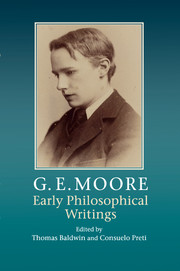Book contents
- Frontmatter
- Contents
- Preface
- Abbreviations and notes
- Editors' introduction
- THE 1897 DISSERTATION: THE METAPHYSICAL BASIS OF ETHICS
- Preface
- Introduction
- Chapter I Freedom
- Appendix: Professor Sidgwick's Hedonism
- EXAMINERS' REPORTS ON THE 1897 DISSERTATION
- THE 1898 DISSERTATION: THE METAPHYSICAL BASIS OF ETHICS
- EXAMINER'S REPORT ON THE 1898 DISSERTATION
- Index
Appendix: Professor Sidgwick's Hedonism
Published online by Cambridge University Press: 05 June 2012
- Frontmatter
- Contents
- Preface
- Abbreviations and notes
- Editors' introduction
- THE 1897 DISSERTATION: THE METAPHYSICAL BASIS OF ETHICS
- Preface
- Introduction
- Chapter I Freedom
- Appendix: Professor Sidgwick's Hedonism
- EXAMINERS' REPORTS ON THE 1897 DISSERTATION
- THE 1898 DISSERTATION: THE METAPHYSICAL BASIS OF ETHICS
- EXAMINER'S REPORT ON THE 1898 DISSERTATION
- Index
Summary
The following criticism only touches directly a very small part of the ‘Methods of Ethics’. But the points discussed seem to be of fundamental importance for any Hedonistic Ethics.
Professor Sidgwick says: ‘I am finally led to the conclusion … that the Intuitional method rigorously applied yields as its final result the doctrine of pure Universalistic Hedonism – which it is convenient to denote by the single word, Utilitarianism’. In this statement I find the cardinal point of dispute. But it is necessary to distinguish. In so far as the Intuitional method is held to establish a Universalistic doctrine, I fully agree; in fact, I should go further than Professor Sidgwick, in as much as I cannot see that Egoistic Hedonism has any claim to an independent validity. I disagree only in so far as it is a Hedonism that the Intuitional Method is said to yield as its result. The argument by which Professor Sidgwick attempts to support his conclusion on this point has two main steps, in neither of which can I see any necessity.
(1) He has already in Book i, chap. ix, ‘confidently laid down’, ‘that, if there be any good other than Happiness to be sought by man, as an ultimate practical end, it can only be the Goodness, Perfection, or Excellence of Human Existence’. Those of his reasons for this view, which I dispute, are wholly contained in the short fourth section of this chapter.
- Type
- Chapter
- Information
- G. E. Moore: Early Philosophical Writings , pp. 87 - 94Publisher: Cambridge University PressPrint publication year: 2011



